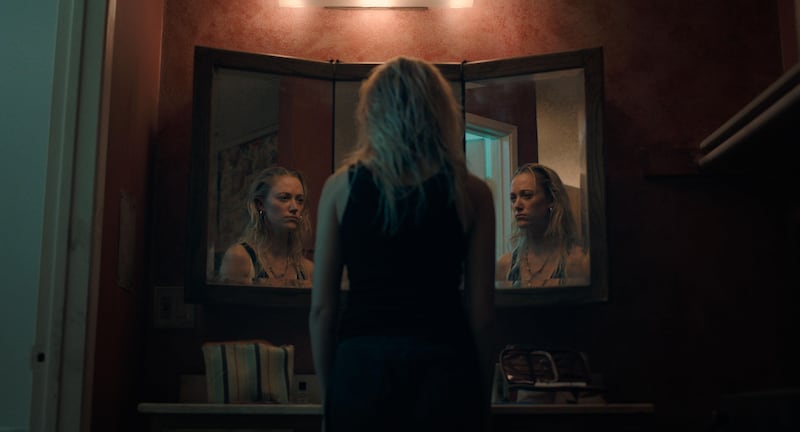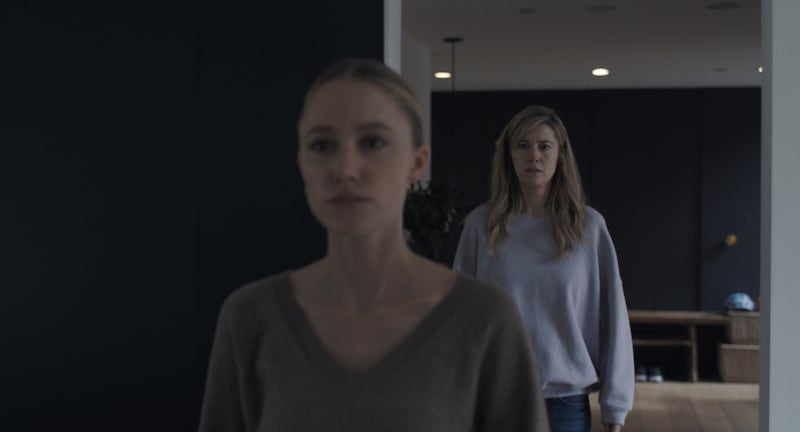There’s something about Maika Monroe’s eyes that has come to signal a certain psychological acuity in the horror movies that have become her specialty over the years. Whether she’s playing a haunted FBI agent in Longlegs, an isolated wife in Watcher, or a death-stalked teenager in It Follows, she conveys more than fear. It’s like a suspicion, sometimes growing and sometimes wearily matured, that things can always get worse.
Monroe maintains that quality in the new Hulu version of The Hand That Rocks the Cradle, streaming Oct. 22, even when she’s recast into the stalker role originally played by Rebecca De Mornay. Monroe plays Polly, a hardscrabble but seemingly dedicated babysitter-turned-nanny for an upper-class family. She’s hired by Caitlyn, played by Mary Elizabeth Winstead, well-matched with Monroe in the field of nuanced scream queens.
The women first meet through Caitlyn’s pro-bono work for tenants’ rights, just before she takes leave for the birth of her second child. When baby Josie joins 10-year-old Emma (Mileiah Vega), Polly starts to feel some heavy postpartum stress, especially with all of her self-imposed rules (no formula, no microplastics, no sugar, etc.). Her husband Miguel (Raúl Castillo) could charitably be called “also busy,” though between this and his part in Cha Cha Real Smooth, stage veteran Castillo has become an expert in playing romantic partners who are supportive on paper and vaguely glowering in person.
So at first, Caitlyn running back into Polly seems like a godsend—as stalker figures usually do at first. She’s especially adept at sensing and then parroting Caitlyn’s fussier rules, flattering the woman in charge. In private, though, she flouts them, leading to an amusingly quasi-menacing scene where she urges both kids to try a big, delicious, store-bought cupcake. Between Monroe’s steady gaze and Winstead’s evocation of parental fussing, the movie does manage to make a kid eating frosting seem like a major transgression.

While the original film was upfront about the stalker nanny’s ultimate motivation and goals, this Hand doesn’t tip quite so early. So while it’s easy to suspect that Polly is up to something, it’s not immediately revealed what that is. (Seriously, the original explains it with confusing quickness.) This leaves some time to mine some ambiguity over whether Polly truly has bad intentions, or if maybe Caitlyn is looking at an imperfect person through a fractured lens combining postpartum depression, mom guilt, and unresolved anger issues.
This is a terrific idea for a 2025 spin on this material, heightening the performances of femininity and domesticity across a class divide that wasn’t there in the original. (There, De Mornay’s character came from a well-off background.) Director Michelle Garza Cervera previously made the pregnancy-themed body horror movie Huesera: The Bone Woman, and slips easily into the post-birth anxieties about control. (One nitpick: If Caitlyn is so adherent to more stringent pediatric recommendations, she wouldn’t be placing her infant in a crib with a blanket. That’s pure set-decorator compulsion.)
The screenplay, credited to Micah Bloomberg, goes further by making both women seemingly bisexual, though Polly seems to identify more as gay while Caitlyn toggles back and forth—as if she’s code-switching for the benefit of her own fractured self. Cervera obliges with many mirror shots depicting Winstead distorted, or in pieces. The icy grey-blue tones may be overfamiliar from other streaming-era films that skimp on color and texture, but it does form a contrast with the more picket-fence suburban environment of the earlier version.

So why isn’t this well-acted, well-shot movie, one that’s unusually suffused with prickly anxieties of womanhood and probably a bit smarter than the 1992 film, ultimately more satisfying? As locked-in as Monroe and Winstead are, the movie never really levels them up; it can only trot out a revelation that admirably avoids turning either one into a full-on villain. Cervera seems determined not to sensationalize the material, an approach that works well for a while but eventually feels like a stubborn opposition to the original film’s tony, domesticated version of exploitation.
If the movie had something more on its mind, that pushback might make sense. But it’s not as if The Hand That Rocks the Cradle doesn’t end with a pair of women attacking each other. This makes all the movie’s most provocative psychosexual overtones—most notably, Caitlyn showing evidence of being turned on by witnessing Polly having sex with her girlfriend—weirdly moot, like the movie is killing time until an abbreviated showdown, and final scene that feels like a sop to anyone hoping for a little horror-movie shiver. The new Hand That Rocks the Cradle wants to be about more than simply updating the social fears this material might prey upon. But in the end, those desires are weirdly polite.
The post ‘The Hand That Rocks the Cradle’ Gets a Modern Scream Queen Remake appeared first on The Daily Beast.




